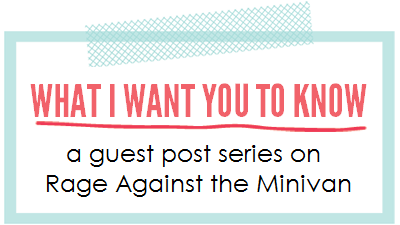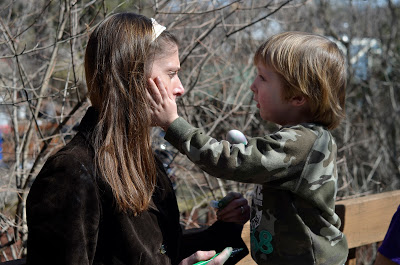My body craves to be nestled into his body — to stroke his hair, to hear his voice, to see his smile. Just one more hug, one more conversation, that’s all I need. I wasn’t ready to give him up. I have so many things left to tell him.
My withdrawal symptoms are physical, materializing in varying forms and severity throughout the day. My heart pounds, my head spins, there’s a lump in my throat. Sometimes I cannot hear when other people talk, I only hear the pounding of my heart. It hurts deep into my soul. Bubbles of grief rise to the surface from nowhere. They are my new constant.
After Charlie died, I left polish on my toes that he helped paint before a trip to Disney World and mourned the color when it was no longer there. There’s the squishy eyeball stuck on our ceiling still, the one we threw up together before his Halloween party. I will it not to ever fall.
For months after his death, I found his squishy bugs, hard plastic animals or zombies with missing heads in bags and pockets. In our piles of paper around the house, his drawings surface from time to time. His pictures are of dying pirates, bloody zombies, tombstones, hearts, rainbows and our family of four holding hands.
Now, our now family of three doesn’t work so well without Charlie. We wobble — everything feels off balance. We don’t know where to eat our meals now. We can’t sit in front of the TV because then we think about Charlie and the shows he liked to watch. It seems too formal to sit at our dining table, and we only have two stools by the kitchen counter. So my daughter Esther sits on her stool, husband John and I tend to stand or take turns on Charlie’s stool.
Going to the supermarket is hard. So many foods I no longer need to buy, aisles I find difficult walking down. He was so clear about what foods he liked — Annie’s Mac and Cheese with ketchup swirled in, fruit strips, Cheerios, pickles, and applesauce.
Somewhere Charlie heard the saying, “an apple a day keeps the doctor away”, and he used to ask if eating lots of applesauce counted. He loved the idea of candy. He would plead for a “lollypop”, have a few sucks then ask for a ziplock bag. It was, he said, to save the rest for a special day. After he died, I found four slightly sucked lollies in separate ziplock bags in his little giraffe backpack.
Picking Esther up from school is hard. Watching the other parents collect their children is hard. Coming home without Charlie in the car is hard. I miss the sibling interaction, the laughs and squabbles. The togetherness.
Bedtime is hard too. No longer can we say, “Let’s get the kids ready for bed.” There is no kids bed time anymore. Just one fragile kid remains in our house. Now Esther’s bedtime is the same as mine. We climb into bed together. This is my time to hug Esther and hold her close. This is the time she never pushes me away.
Esther has slept in our bed ever since the night I woke her up to tell her that Charlie had died.
As I picked her up in her deep sleep state, at first I did not say he had died. All I said was that she needed to wake up so she could kiss Charlie goodbye. When Esther saw him swaddled up in a blanket, she was calm and she knew Charlie was dead. Tenderly she kissed his forehead. As she kissed him, I saw his hand peeking out from under the blanket, and tried to look away. But it was too late as Esther saw me staring. Charlie’s sweet little hand was so limp and white and his fingernails had already turned black.
“What’s wrong with Charlie’s fingernails?” Esther whispered.
“Oh honey…..” I wanted to protect her. “Before he died he wanted me to paint his nails. You know he loves Halloween and loves the color black”.
“Oh.” She replied.
The lie had tumbled from my lips.
Esther reached for my hand and we sat next to Charlie, hugging and waiting for someone to tell us what to do next. Esther let me get away with that ridiculous lie. For that, I am grateful.
Every time I go to the toilet at home, I think of Charlie. The last month plus of his life we shared the most intimate moments by the toilet. It was getting difficult for him to urinate. He never had an accident and could hold his urine for hours and hours. But in the middle of the night, he would need to go to the toilet. Once we got there, nothing would happen.
He would sit. Then stand. He was in obvious discomfort. As the days passed, his pain and discomfort increased. We would sit by the toilet for twenty, maybe thirty minutes. He whimpered in pain. I offered encouragement. Eventually, he could no longer sit or stand without support.
I held his body weight, stroked his hair, and whispered words of love. Along with the physical pain, I know his pride was getting injured. I know it was scary and confusing to a five year old with a declining body. But he didn’t cry. He hardly ever cried.
Then began our ritual: When finally he peed, I would ask for his help to lift me up from the bathroom floor. I pretended I needed his help. He had little strength. But with a light and delicate touch, he held my hands and “lifted” me up. He could barely stand unassisted. Then I would stand up, pretending his little hands alone were lifting me. The muscles in my legs shook.
“See Charlie, your Mama needs you too. We all need help sometimes. Thanks for helping me Charlie.”
He smiled. He held my gaze. He knew my little game. “Thank you, mummy. You know I love you more than fish love water.”
I shouldn’t really tell others about when I go to the toilet, but it highlights how losing him has affected everything in my life.
Charlie used to wake up at 4:00 AM and insist on going downstairs to watch TV on the sofa. He didn’t want me to leave his side during these times, even to go to the toilet. So, I decided to pee in his potty and we both laughed when I did. After that first time it became acceptable to use his little toilet, our new normal. I don’t pee in the potty anymore. Esther doesn’t either. With Charlie in the house it was acceptable, but now that he’s gone, it is no longer.
How I loved Charlie in the deepest way. In the early morning of which he died, this is what I remember clearly.
I had been lying all night by his side on the sofa. After a while I became aware that his breathing was more labored and I began to feel less connected to his body. John had gone up to bed around 10:00 pm. He was exhausted and needed to sleep.
At 12:20 am John came downstairs. He sat next to Charlie and I moved away. I stood not far from Charlie’s side, watching a father tenderly stroke his dying son’s hair, kiss his lips and place his hands on his loudly moving chest.
Then it happened. Charlie died. He took in a deep loud breath. The sound is so very clear in my memory. He never breathed out.
Oh Charlie, my clever little guy. He waited for his Daddy before taking his last breath.
I remember feeling no longer connected to Charlie’s body. But that didn’t matter. I felt his soul enter my heart, into my soul. I felt completely swaddled in his love. I felt safe. I felt complete disbelief. I knew that my brain could not quite grasp the depth of what just had happened. I don’t think it ever will.
It was time to be practical. Emotions had to be stuck away in a box to be explored in months to come. I jotted down the time – 12:25 am – on a scrap of paper. I took his last photograph. I called the after-hours hospice number.
Then the worst Michigan winter imaginable rolled in and silence crept in with it. No more Charlie hugs, or smiles, or cheeky giggles; no more siblings laughing and playing for hours; no more children’s toys scattered around or sibling squabbles; no more children’s parties or little kid play dates. No more appointments with doctors or researchers. No more discussions with friends about fundraisers or experimental treatments. No more relatives visiting from overseas. No more foundations stepping in to help.
Silence.
Awkward moments and averted glances.
No more curiosity about our lives.
Lost acquaintances and distant friendships.
And then more silence.
I know we will be ok. Somehow our family will figure out how to live with this grief that sits deep in our hearts forever. In the meantime, I continue to be inspired by the Foundation we created when Charlie was diagnosed, Art for Charlie. Our mission is to alleviate the suffering of all gravely ill children, and to try to ease the lifelong pain of any family that has a lost a child. We also want to remember all the children with a life limiting illness and to tell their stories through their art. Apart from the Foundation, I work to promote Charlie’s wish for universal kindness through our campaigns in schools and communities
Oftentimes I wonder how I can help other people, when I myself need all the help I can get. It’s Charlie, who exemplified so much kindness in his short life, who reminds me to keep going, to continue caring for others, too. We are all in this together.
When child dies, there is rarely closure. The pain changes but it will never go away.
*Abigail Waller is a clinical social worker who lives with her family in Michigan. She is co-founder of Art for Charlie Foundation. She is the mother of two children, Esther aged 10, and Charlie, forever 5.



Abigail, Charlie sounded like an amazing little man! In what ways he has changed you! Esther sounds like she was a great older sister and is still fulfilling that role! What a blessing she is to both of you! Cancer sucks, it seems to win to much I am so sorry to hear of your loss… Not only Charlie which is by far the biggest loss, but also for the loss of support, it is still needed…. So sorry! Hugs Paula
Thank you for sharing your story with us.
How this makes me ache and I haven't even known a loss like this one. I am so sorry.
What amazing moments you have of Charlie. Thinking of you.